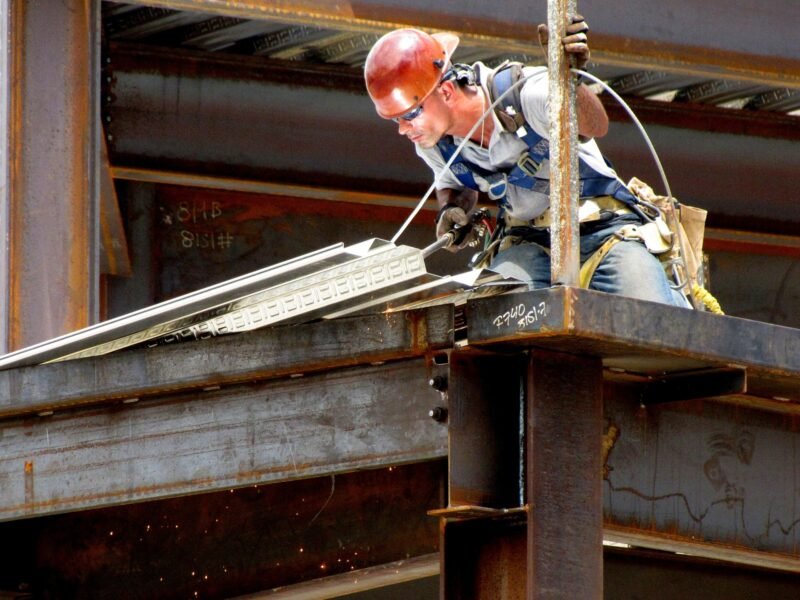Are you interested in pursuing a career as a welder in Canada? Welding jobs is a skilled trade with high demand across various industries, including manufacturing, construction, automotive, and energy.
Canada’s economic landscape continually drives the need for skilled tradespeople, particularly welders, to support infrastructure projects and industrial production.
Why Welding Jobs is a High-Demand Profession in Canada
Canada’s strong construction, manufacturing, and energy sectors create opportunity for welding jobs. Welders play a crucial role in building and maintaining infrastructure, such as bridges, pipelines, and factories.
According to the Canadian Welding Bureau (CWB), the country faces a shortage of skilled welders, making welding jobs an attractive career option with a promising job outlook.
Most important, with Canada embracing its shift to renewable energy sources increasingly, those with a knack for wind and solar energy in specialty welding processes are highly requested.
How to Obtain Welding Jobs in Canada
To have a welding job as a welder in Canada, you need the right qualifications, training, and in most cases, you require certification. Here are steps on becoming a welder:
• Education and Training: Most employers require that welders have at least a high school diploma or its equivalent. However, the training is essential in the technical field; thus, many aspiring welders complete an apprenticeship or a post-secondary welding program at a technical college.
• Certification: Very often, certification is required in Canada, especially for specific fields. The Canadian Welding Bureau certifies weldings in various welding processes, such as SMAW, FCAW, GTAW. Provinces may also lay down additional requirements, most especially for trades regulated by a particular provincial trade organization.
• Apprenticeship Program: Most welding jobs start this way. This process gives an experience to the apprentice to work under the guidance of certified welders and advance their skills further with acquired knowledge.
• Specialized Skills: Welders with experience in niche techniques such as TIG welding or underwater welding are very well sought after. Many employers prefer such candidates because, most of the time, such specialized skills involve special licenses.
Types of Welding Jobs in Canada
Welding covers a broad area of expertise and occupation that opens up a host of job opportunities. Following are some of the most common welding jobs in Canada:
- Structural Welding: Works on large projects such as building and bridge construction.
- Pipe Welding: Specializes in the joining of pipelines, generally utilized in industries like oil, gas, and chemicals.
- Manufacturing Welding: Found in factories and assembly lines, the building of components for machinery, automobiles, and many more.
- Underwater Welding: Welding tasks performed underwater, generally for marine construction projects.
- Boilermaker Welding: Engaged in the construction and maintenance of boilers and tanks.
Average Salary for Welding Jobs in Canada
Welding Jobs is a well-paying job in Canada, and the salaries depend on experience, location, and specialization. On average, welders in Canada earn from CAD 42,000 to CAD 70,000 annually.
Here is a closer look at how salaries vary by specialization and experience:
a. Entry-Level Welders: They usually make about CAD 20 to CAD 25 per hour.
b. Experienced Welders: With five or more years of experience, welders can earn up to CAD 35 per hour or more.
c. Specialized Welders: Underwater welders and those with specific certifications can command higher salaries, often surpassing CAD 80,000 annually.
Average Salary by Province
Wages also vary significantly by location, with welders in regions like Alberta and Ontario often earning more due to the high concentration of industries that rely on welding skills.
Province ————– Average Annual Salary
Alberta —————– CAD 58,000
Ontario —————— CAD 53,000
British Columbia ———– CAD 50,000
Quebec ——————- CAD 48,000
Employment Outlook for Welding Jobs in Canada
Demand for welders will be healthy for a while to come, given that the government is spending massively on infrastructure and expansion is happening ceaselessly in renewable energy. Thus, welders with more specialized skills-say TIG welding or robotic welding-will have better employment prospects as the industry gets into the orbit of automation and newer technologies.
Besides, Canada’s striving for skilled immigration means a field day for foreign-trained welders to enter the workforce. Programs like the Federal Skilled Trades Program offer routes for qualified welders from other countries to obtain work permits and permanent residency.
How to Apply for Welding Jobs in Canada as a Foreigner
If you are a foreign national who wishes to pursue a career in welding in Canada, several immigration programs have made your entry easier. Here’s a step-by-step guide on how to approach it:
- Research Provincial Nominee Programs: Certain provinces have particular programs for skilled tradespeople, including welders, under the Provincial Nominee Program.
- Federal Skilled Trades Program: Welders may qualify for Canada’s Express Entry system through the FSTP, which is a fast-track immigration program for skilled trades.
- Work Permits and Job Offers: Obtaining a job offer from a Canadian employer will dramatically improve your chances of a successful work permit application.
You should also ensure your qualifications meet the Canadian standards by getting a welding certification from the Canadian Welding Bureau. Such qualifications enhance your employability as Canadian employers would always prefer a welding candidate with a locally recognized certification.
Frequently Asked Questions About Welding Jobs in Canada
Q: What is average wage for a welder in Canada?
A: The average salary for a welding in Canada ranges from CAD 42,000 to CAD 70,000 annually, depending on experience, location, and specialization.
Q: Are welding jobs in demand in Canada?
A: Yes, welding is in high demand in Canada, especially in industries such as construction, manufacturing, and energy.
Q: Do I need certification to for a welding job in Canada?
A: Many welding positions in Canada require certification from the Canadian Welding Bureau (CWB), and some provinces have additional requirements.
Q: Can foreign nationals apply for welding jobs in Canada?
A: Yes, foreign nationals can apply for welding jobs in Canada, often through immigration programs like the Federal Skilled Trades Program or Provincial Nominee Programs.
Q: What skills are most valuable for welding jobs in Canada?
A: Specialized welding skills, such as TIG and robotic welding, are in high demand, along with certifications from recognized bodies like the Canadian Welding Bureau.






